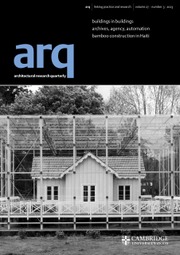Article contents
Reviving a sense of poetry: assessing Wang Shu’s contemporary design practice
Published online by Cambridge University Press: 31 May 2022
Extract
Chinese men of letters pursued the idea of a poetic life in feudal times, and this ideal was often embodied in traditional gardening and landscape paintings. However, it has been argued that the pursuit of this traditional notion of poetic life has been lost with the arrival of modernity. In this view, Chinese cities are seen as losing their identities and becoming Westernised. Wang Shu, the Pritzker Prize-winning Chinese architect, has taken great efforts to rebuild an understanding of Chinese cultural identity: by looking back to the idea of poetic life reflected in traditional gardens and landscape paintings, and attempting to recompose a sense of poetry for contemporary architecture. This article aims to examine Wang’s approaches to this sense of poetry in one of his projects, the design of Xiangshan campus while, at the same time, seeking to offer a Chinese reflection on the architecture of poetry.
However, Wang’s approach to using visual and metaphoric techniques in reviving the city’s poetic system can be questioned. His tactics, considered here in relation to the Xiangshan campus, arguably do not fully understand Chinese aesthetics, and do not pose fully a contemporary definition of the ‘sense of poetry’ in relation to the traditional Chinese mind. A holistic interpretation of architectural poetry should concern life, both as living and pleasure, material and spirit, rather than dealing primarily in visual composition. Nevertheless, his efforts in exploring Chinese-ness and his influence on Chinese architects remain highly significant.
- Type
- Criticism
- Information
- Copyright
- © The Author(s), 2022. Published by Cambridge University Press
- 1
- Cited by




